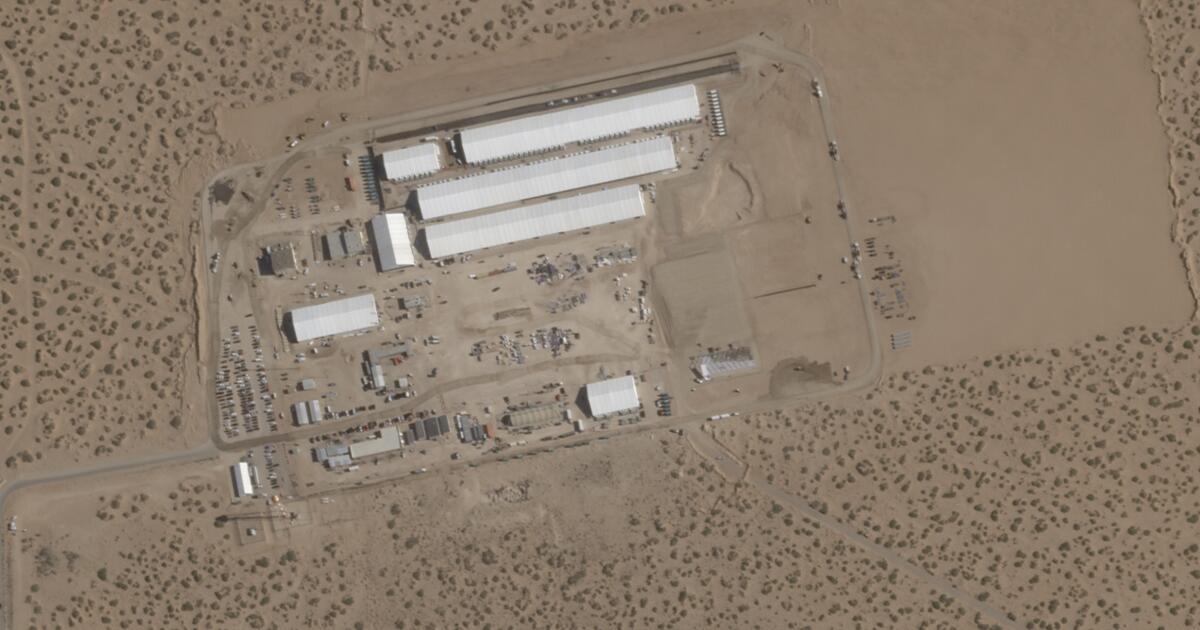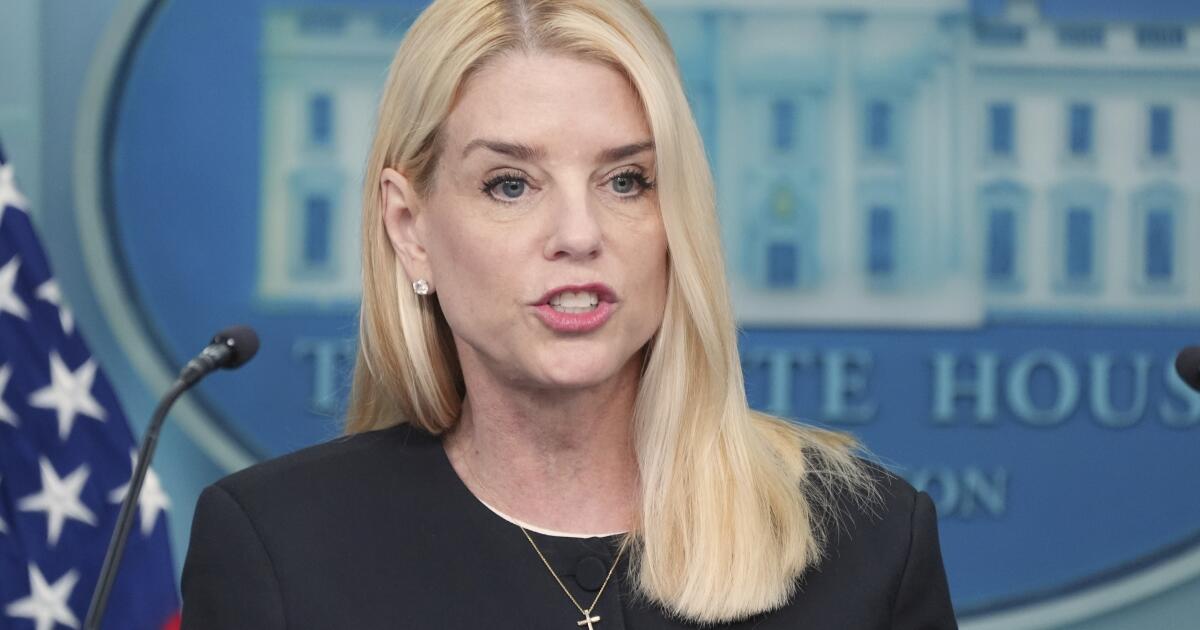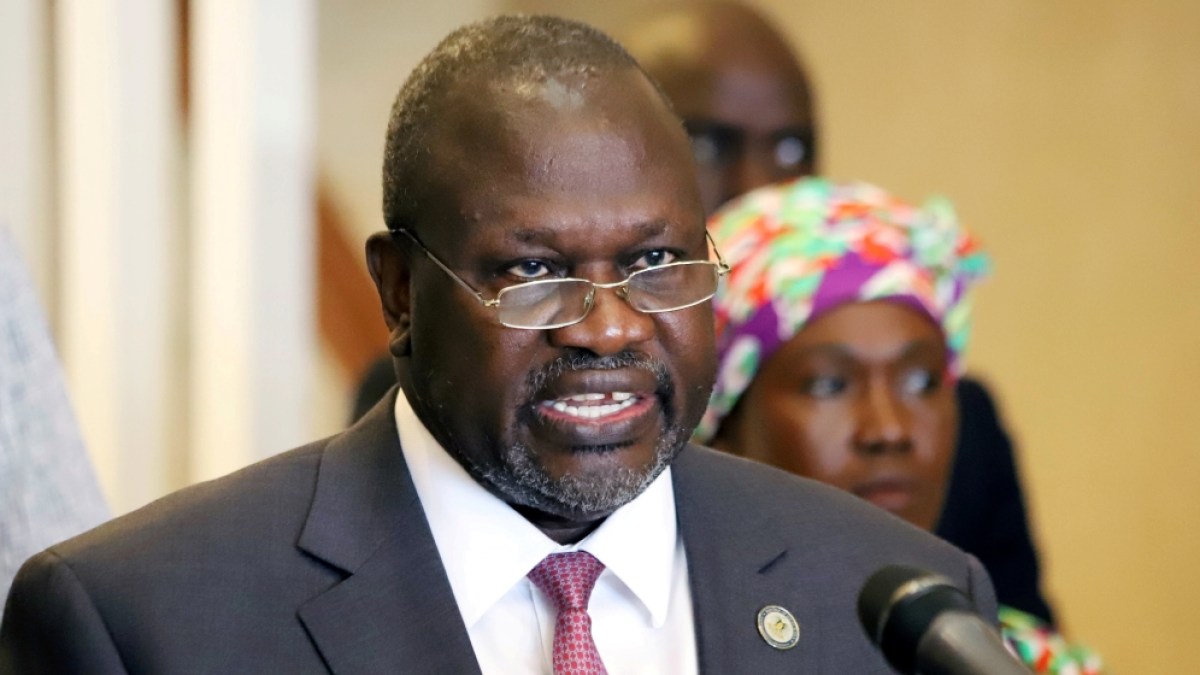Mystery surrounds $1.2 billion Army contract to build huge detention tent camp in Texas desert
WASHINGTON — When President Trump’s administration last month awarded a contract worth up to $1.2 billion to build and operate what it says will become the nation’s largest immigration detention complex, it didn’t turn to a large government contractor or even a firm that specializes in private prisons.
Instead, it handed the project on a military base to Acquisition Logistics LLC, a small business that has no listed experience running a correction facility and had never won a federal contract worth more than $16 million. The company also lacks a functioning website and lists as its address a modest home in suburban Virginia owned by a 77-year-old retired Navy flight officer.
The mystery over the award only deepened last week as the new facility began to accept its first detainees. The Pentagon has refused to release the contract or explain why it selected Acquisition Logistics over a dozen other bidders to build the massive tent camp at Fort Bliss in west Texas. At least one competitor has filed a complaint.
The secretive — and brisk — contracting process is emblematic, experts said, of the government’s broader rush to fulfill the Republican president’s pledge to arrest and deport an estimated 10 million migrants living in the U.S. without permanent legal status. As part of that push, the government is turning increasingly to the military to handle tasks that had traditionally been left to civilian agencies.
A member of Congress who recently toured the camp said she was concerned that such a small and inexperienced firm had been entrusted to build and run a facility expected to house up to 5,000 migrants.
“It’s far too easy for standards to slip,” said Rep. Veronica Escobar, a Democrat whose district includes Fort Bliss. “Private facilities far too frequently operate with a profit margin in mind as opposed to a governmental facility.”
Attorney Joshua Schnell, who specializes in federal contracting law, said he was troubled that the Trump administration has provided so little information about the facility.
“The lack of transparency about this contract leads to legitimate questions about why the Army would award such a large contract to a company without a website or any other publicly available information demonstrating its ability to perform such a complicated project,” he said.
Ken A. Wagner, the president and CEO of Acquisition Logistics, did not respond to phone messages or emails. No one answered the door at his three-bedroom house listed as his company’s headquarters. Virginia records list Wagner as an owner of the business, though it’s unclear whether he might have partners.
Army declines to release contract
Defense Secretary Pete Hegseth approved using Fort Bliss for the new detention center, and the administration has hopes to build more at other bases. A spokesperson for the Army declined to discuss its deal with Acquisition Logistics or reveal details about the camp’s construction, citing the litigation over the company’s qualifications.
The Department of Homeland Security, which includes U.S. Immigration and Customs Enforcement, declined to answer questions about the detention camp it oversees.
Named Camp East Montana for the closest road, the facility is being built in the sand and scrub Chihuahuan Desert, where summertime temperatures can exceed 100 degrees Fahrenheit and heat-related deaths are common. The 60-acre site is near the U.S.-Mexico border and the El Paso International Airport, a key hub for deportation flights.
The camp has drawn comparisons to “Alligator Alcatraz,” a $245 million tent complex erected to hold ICE detainees in the Florida Everglades. That facility has been the subject of complaints about unsanitary conditions and lawsuits. A federal judge recently ordered that facility to be shut down.
The vast majority of the roughly 57,000 migrants detained by ICE are housed at private prisons operated by companies like Florida’s Geo Group and Tennessee-based CoreCivic. As those facilities fill up, ICE is also exploring temporary options at military bases in California, New York and Utah.
At Fort Bliss, construction began within days of the Army issuing the contract on July 18. Site work began months earlier, before Congress had passed Trump’s big tax and spending cuts bill, which includes a record $45 billion for immigration enforcement. The Defense Department announcement specified only that the Army was financing the initial $232 million for the first 1,000 beds at the complex.
Three white tents, each about 810 feet long, have been erected, according to satellite imagery examined by the Associated Press. A half dozen smaller buildings surround them.
Setareh Ghandehari, a spokesperson for the advocacy group Detention Watch, said the use of military bases hearkens back to World War II, when Japanese Americans were imprisoned at Army camps including Fort Bliss. She said military facilities are especially prone to abuse and neglect because families and loved ones have difficulty accessing them.
“Conditions at all detention facilities are inherently awful,” Ghandehari said. “But when there’s less access and oversight, it creates the potential for even more abuse.”
Company will be responsible for security
A June 9 solicitation notice for the Fort Bliss project specified the contractor will be responsible for building and operating the detention center, including providing security and medical care. The document also requires strict secrecy, ordering the contractor inform ICE to respond to any calls from members of Congress or the news media.
The bidding was open only to small firms such as Acquisition Logistics, which receives preferential status because it’s classified as a veteran and Hispanic-owned small disadvantaged business.
Though Trump’s administration has fought to ban diversity, equity and inclusion programs, federal contracting rules include set-asides for small businesses owned by women or minorities. For a firm to compete for such contracts, at least 51% of it must be owned by people belonging to a federally designated disadvantaged racial or ethnic group.
One of the losing bidders, Texas-based Gemini Tech Services, filed a protest challenging the award and the Army’s rushed construction timeline with the U.S. Government Accountability Office, Congress’ independent oversight arm that resolves such disputes.
Gemini alleges Acquisition Logistics lacks the experience, staffing and resources to perform the work, according to a person familiar with the complaint who wasn’t authorized to discuss the matter and spoke on the condition of anonymity. Acquisition Logistics’ past jobs include repairing small boats for the Air Force, providing information technology support to the Defense Department and building temporary offices to aid with immigration enforcement, federal records show.
Gemini and its lawyer didn’t respond to messages seeking comment.
A ruling by the GAO on whether to sustain, dismiss or require corrective action is not expected before November. A legal appeal is also pending with a U.S. federal court in Washington.
Schnell, the contracting lawyer, said Acquisitions Logistics may be working with a larger company. Geo Group Inc. and CoreCivic Corp., the nation’s biggest for-profit prison operators, have expressed interest in contracting with the Pentagon to house migrants.
In an earnings call this month, Geo Group CEO George Zoley said his company had teamed up with an established Pentagon contractor. Zoley didn’t name the company, and Geo Group didn’t respond to repeated requests asking with whom it had partnered.
A spokesperson for CoreCivic said it wasn’t partnering with Acquisition Logistics or Gemini.
Biesecker and Goodman write for the Associated Press. Goodman reported from Miami. AP writer Alan Suderman in Richmond, Va., and Morgan Lee in Santa Fe, N.M., contributed to this report.



